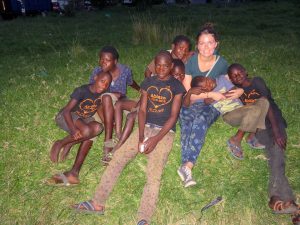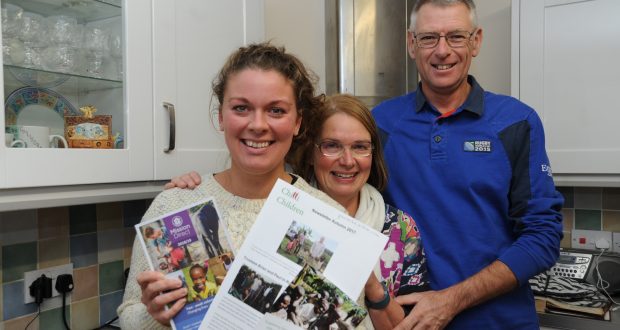When a Spalding family went on holiday to Uganda nearly a decade ago, they never knew it would inspire years of charity work.
Eldest daughter Emily Braybrook (26) was a teenager at the time.
She’s now spent two and a half years living in Uganda helping out in a host of roles including with the charity Chilli Children of which her Stonegate family are also involved.
Mum and dad, Rachel and Paul Wilson are trustees with the charity while Emily’s younger sister Alice Braybrook (23) is a parliamentary advocate with the charity Christian Solidarity working in London with the Foreign Office.
Rachel said of the 2008 family trip: “Emily and Alice were typical teenage girls with first world problems and we felt it would be good for them and us to see how people in different countries live.
“We thought it might be a wake up call, but it’s been far more than that.”
Speaking on her return to Spalding for Christmas, Emily said of that first trip to Uganda: “It changed our lives.
“I feel like we have two homes now. I think Spalding will always be home but I’ve also found a second home in Africa.
“I just fell in love with Uganda.”
Inspired by the continent, Emily immediately changed the course she was to study at Birmingham University to African Studies.
After graduating she initially went back to Africa with the charity Mission Direct and receives funding through charitable sources including the London based Christ Church she’s involved in.
She also became familiar with Chilli Children. The project supports children with severe special needs in south west Uganda and runs a school for them.
It also aims to get their families growing chilli, a crop they can support themselves from by exporting with the aim that it will pay for school fees and medication.
“It’s an amazing project,” continued Emily. “We give them the seeds, they can plant them and sell them on.
“No animals, nor Ugandans themselves eat chillies so they only grow the crops to make money for their families.”
Chilli Children also runs one of just two special needs schools in Uganda.
Emily continued: “Those with disabilities can be shunned by the community.
“There’s different beliefs including some about how those with disabilities are a result of witchcraft. There’s no NHS so they get ignored.
“We actively go out and look for the families of those with disabilities so we can help them.”
“The project provides a safe place for them and looks to get them help.
“Without the project there’s nothing for these families.”

Emily Braybrook with the “street boys”
Emily also works voluntary in a local prison as well as looks after a group of what she calls “streetboys”.
She describes helping these eight to 14-year-olds who would otherwise be left on their own, sniffing glue and causing trouble, as a highlight.
“When I first moved to Uganda I kept seeing them around and I just felt I wanted to do something for them.
“They’re seen in the community as almost animals but they’ve just never been shown support and loved.
“They’ve been thrown out and have to go out on the rubbish tip to find food.
“I rented a room for them so they didn’t have to sleep in the bushes.
“I got in touch with two local teachers, got a classroom and got them used to going to school.
“They loved it because they were desperate to go to school. Since then I’ve been able to find sponsors for them and put them in boarding school.
“Most of them are now performing amazingly academically, I can’t believe the change in them.
“I’m really proud of them and excited for the future.”
Emily will certainly be living in Uganda for at least another six months and says she is taking it one year at a time as to whether she will stay in the country further.
It’s clear she loves what she does and will remain involved in the charity work whatever the future holds.
“I think in the West we can be guilty of seeing Africans as just weak and not able to look after themselves,” she continued. “I found in Uganda that the people are such strong people and resilient.
“It’s all about the community. You are surprised about how they look after each other and share everything.
“We shouldn’t see them as problems to be solved. We should support them and empower them for what they already do.”
Emily initially struggles to answer when asked why she does it, as if she’s never really thought about it before.
“It’s been a privilege going out there. I don’t see what I’m doing as being their saviour, I just see it as meeting a need.
“I’m really thankful for my parents. They’ve been so supportive.”
Mum Rachel said: “Both our daughters have become young ladies who are independent and compassionate.
“We’re hugely proud of them.”
 The Voice of Spalding and South Holland
The Voice of Spalding and South Holland




